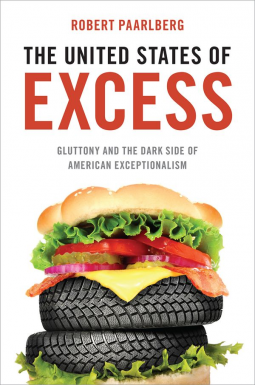
The United States of Excess
Gluttony and the Dark Side of American Exceptionalism
by Robert Paarlberg
This title was previously available on NetGalley and is now archived.
Buy on Amazon
Buy on BN.com
Buy on Bookshop.org
*This page contains affiliate links, so we may earn a small commission when you make a purchase through links on our site at no additional cost to you.
Send NetGalley books directly to your Kindle or Kindle app
1
To read on a Kindle or Kindle app, please add kindle@netgalley.com as an approved email address to receive files in your Amazon account. Click here for step-by-step instructions.
2
Also find your Kindle email address within your Amazon account, and enter it here.
Pub Date Apr 01 2015 | Archive Date Mar 04 2015
Description
Compared to other wealthy countries, America stands out as a gluttonous over-consumer of both food and fuel. The United States boasts an obesity prevalence double the industrial world average, and per capita carbon emissions twice the average for Europe. Still worse, the policy steps taken by America in response to obesity and climate change have so far been the weakest in the industrial world. These aspects of America's exceptionalism are nothing to be proud of.
Is it possible that America is hard-wired to consume too much food and fuel? Unfortunately, yes, says Robert Paarlberg in The United States of Excess. America's excess is driven in each case by its distinct endowment of material and demographic resources, its unusually weak national political institutions, and a unique political culture that celebrates both individual freedoms over social responsibility, and free markets over governmental authority. America's over-consumption is shown to be over-determined.
Because of these powerful underlying circumstances, America's strongest policy response, both to climate change and obesity, will be adaptation rather than mitigation. As the damaging consequences of climate change become manifest, America will not impose adequate measures to reduce fossil fuel consumption, attempting instead to protect itself from storms and sea-level rise through costly infrastructure upgrades. In response to the damaging health consequences of obesity, America will opt for medical interventions and physical accommodations, rather than the policy measures that would be needed to induce better diets or more exercise.
These adaptation responses will generate serious equity problems, both at home and abroad. Responding to obesity with medical interventions will fall short for those in America most prone to obesity - racial minorities and the poor - since these groups have never enjoyed adequate access to quality health care. Responding to climate change by building more resilient infrastructures at home, while allowing atmospheric concentrations of CO2 to continue their increase, will impose greater climate disruption on poor tropical countries, which are far less capable of self-protection. Awareness of these inequities must be the starting point toward altering America's current path.
Is it possible that America is hard-wired to consume too much food and fuel? Unfortunately, yes, says Robert Paarlberg in The United States of Excess. America's excess is driven in each case by its distinct endowment of material and demographic resources, its unusually weak national political institutions, and a unique political culture that celebrates both individual freedoms over social responsibility, and free markets over governmental authority. America's over-consumption is shown to be over-determined.
Because of these powerful underlying circumstances, America's strongest policy response, both to climate change and obesity, will be adaptation rather than mitigation. As the damaging consequences of climate change become manifest, America will not impose adequate measures to reduce fossil fuel consumption, attempting instead to protect itself from storms and sea-level rise through costly infrastructure upgrades. In response to the damaging health consequences of obesity, America will opt for medical interventions and physical accommodations, rather than the policy measures that would be needed to induce better diets or more exercise.
These adaptation responses will generate serious equity problems, both at home and abroad. Responding to obesity with medical interventions will fall short for those in America most prone to obesity - racial minorities and the poor - since these groups have never enjoyed adequate access to quality health care. Responding to climate change by building more resilient infrastructures at home, while allowing atmospheric concentrations of CO2 to continue their increase, will impose greater climate disruption on poor tropical countries, which are far less capable of self-protection. Awareness of these inequities must be the starting point toward altering America's current path.
Available Editions
| EDITION | Hardcover |
| ISBN | 9780199922628 |
| PRICE | $21.95 (USD) |







